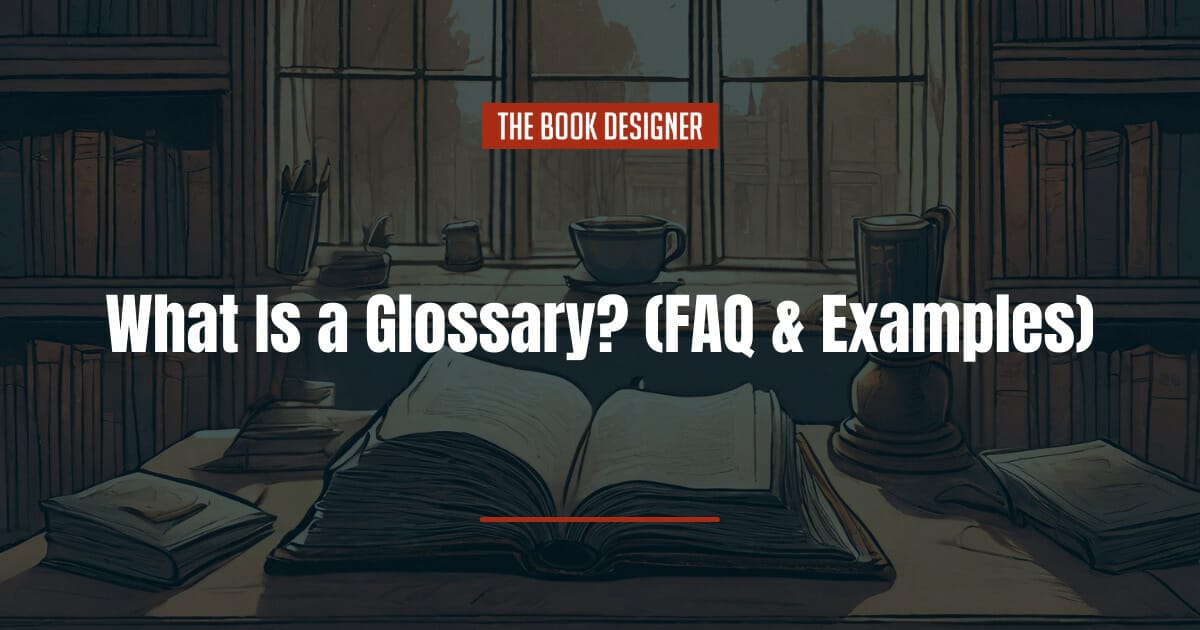As writers, it’s easy to focus on the writing of the book itself, the main copy. After all, without those thousands of words your book wouldn’t exist. They are crucial.
But there are other parts to a book: Title page, dedication, contents, foreword, acknowledgments, endnotes, etc. Which parts you include depend on the genre that you write. Not all books need endnotes, after all.
However, whatever genre you’re writing, it’s helpful to have a general knowledge base regarding the parts of a book. It’s also beneficial to have a general understanding to draw from should you need to include specific parts in future books.
Depending on the genre of your work-in-progress (WIP), you may or may not need a glossary, but glossaries are a useful tool and are worth discussion.
In this article, we’ll cover everything you need to know about adding a glossary to your book:
What is a glossary?
According to the Chicago Manual of Style, 17th Edition, a glossary is often, “…in a book containing many words in another language or other unfamiliar terms.”
Rather than needing to run to the dictionary or get out your phone to look up a word, a glossary enables you to stay in the book while still discovering what you need to.
The Chicago Manual of Style goes on to say, “Words to be defined should be arranged in alphabetical order, each on a separate line and followed by its definition…A glossary usually precedes the notes and bibliography or reference list but may follow the notes. A glossary that consists mainly of terms that do not appear in the text may be included as an appendix.”
A glossary takes a similar format to the dictionary: Alphabetized, with words followed by their definitions.
To be concise: A glossary is a collected list of words with their meanings.
Examples of Glossaries
Think of glossaries as a dictionary specific to your book. Glossaries are words paired with their definitions, so they resemble a page from a dictionary.
Here is an example:
Glossary:
Word ……………….. Definition
Word ……………….. Definition
Word ……………….. Definition
Word ……………….. Definition
Word ……………….. Definition
It’s as simple as that. What words and what type of definitions you include is largely dependent on what you’re writing.
If you’re writing a book on zoology, aimed at elementary readers, your definitions will probably look different than if you’re writing the same book for college students.
The same can be said for books on writing. If you’re writing a book on writing for new writers, the words you choose to appear in your glossary will look different than if you’re writing about the same subject for successful authors.
For example, if you’re writing a book on writing for newbie writers, your glossary may look like this:
Glossary:
First Draft ……………….. The first time you write your story, before edits
Redundant ……………… Writing in a way that over-explains (Ex: The boy walked through the open door.)
Protagonist ………………The main character in a story
Villain……………………..The “bad guy” character the protagonist must go up against
If you’re writing a book on writing for successful authors, the glossary may look like this:
Glossary:
Moderate Immersion ……………….. Tight third person, limited POV
Deep POV ………………..Writing from the character’s POV, no narrative voice
As you look at the above examples, consider your own WIP and what type of words your readers may need further explained.
Does My Book Need a Glossary?
Whether or not your book needs a glossary is largely dependent on the genre of your book, target audience, and detail of your book.
If you think there is even a small percentage of your target audience that will benefit from a glossary you should probably spend the extra time to include one. Writing is about putting the reader first, and this applies to more than just the story aspect of the book.
If your book is nonfiction and a bit more of a difficult read, a glossary will likely be useful as well. Let’s say you’re a doctor and are writing about your experience in medical school.
Whether you realize it or not, you will probably use a different verbiage to write your story than someone who just graduated with a theater or accounting degree.
To ensure readers get the most out of your story, it would be helpful to include a list of words and their definitions.
That way when you say you just finished cadaver lab and went back home to study achlorhydria and chondrocalcinosis, your readers will easily be able to know what you’re studying, without having to put your book down.
But What if I Write Fiction? Do I Still Need a Glossary?
This time, let’s say you’re writing a middle grade fantasy and have created magic spells, medicines unique to that world, and interpersonal titles not used in our world.
Keeping track of all these words may get cumbersome for a middle grade reader.
If your plot hinges on a princess with the title _____ finding the medicine ______ so she can work _____ magic spell, a simple glossary will help provide clarity.
Think of a glossary for fiction like a family tree. A family tree outlines family members and shows their relationship to each other with the intention of providing clarity. In the same way, a glossary outlines terms and shows their definitions with the intention of creating a more enjoyable read.
Including a glossary can benefit young readers’ reading comprehension, as well as their overall understanding, and therefore enjoyment of the book.
Put the Reader First
While a glossary may feel like extra work that doesn’t add to your story and simply fills your writing time, a glossary can show the reader how much you care about their reading experience.
We edit our writing over and over so readers can forget about the page and feel completely immersed in the story.
Imagine being in the middle of the climax and coming across a word you feel you need to know the definition to, but just can’t quite remember what it is. Maybe it’s a word from our world and you could go look it up, but maybe it’s a world from the story only and you have to flip back page by page to find when it was first introduced.
Talk about slowing the story!
Glossaries help prevent small distractions from becoming big ones. When you take the time to find the words you know your readers will need to know, as well as include definitions that succinctly explain their intended meaning for your book, you put the reader first.
Yes, writing is fun. Yes, we write because we love it.
But sometimes we can take that writing energy, focus it in a new direction, and bring a whole new level of reading enjoyment to our readers.
Taking this extra time is worth it if it makes reading your story a better experience for your fans.
Next time you go to write your WIP, consider if it needs a glossary. You may be surprised at how much it ends up helping your story go from good to great!




